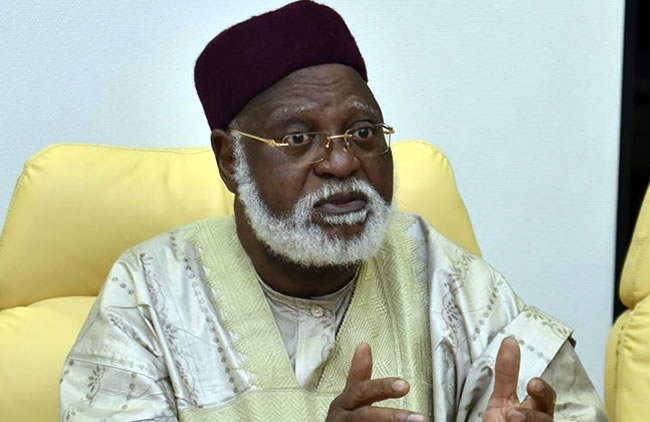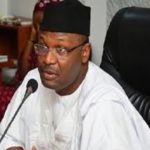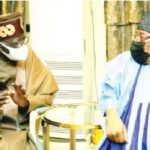
FORMER Head of State, General Abdulsalami Abubakar (retd), on Thursday observed that with the challenges of Boko Haram insurgency, secessionist agitations, banditry, kidnappings and abductions, Nigeria is at a crossroads.
Speaking as the chairman of the Daily Trust Dialogue with the theme, ‘2023: The Politics, Economy and Insecurity’, in Abuja, he stressed the need for authorities to take advice in good faith and work with them.
He said, “Nigeria is once again at a crossroads. Insecurity remains the single most difficult challenge for our country today- the Boko Haram insurgency in the North-East, banditry in the North-West, and violent secessionist agitations in the South-East, kidnappings and abductions of travelers across many states all continue to fester in the land.
“Ethnic, religious and communal conflicts are rearing their ugly heads again in many parts of the country. All of these have greatly challenged and overstretched our security forces.
“Whatever we discuss and agree on today, we hope that the authorities will take it in good faith and work with it. In my own experience as a leader, I have found that collective wisdom is all better than individual ability.”
The former military leader regretted that insecurity, especially in the last few years, had caused loss of lives and material resources while displacing millions of citizens from their homes.
IN CASE YOU MISSED THESE FROM NIGERIAN TRIBUNE
- ‘Officials initially offered to help but when the number of able-bodied citizens at the centre increased, they left us unattended to’
- Police, Amotekun after criminals on Lagos-Ibadan expressway
Giving some statistics, he said, “These challenges have caused thousands of deaths and millions of Internally Displaced Persons, IDPs, in Nigeria over the past 13 years. According to the Global Conflict Tracker compiled by the US Council on Foreign Relations, CFR, some 350,000 persons have been killed and three million displaced directly or indirectly in the conflict in the North-East since 2009.
“A report by Beacon Consulting, a Nigerian security risk consultancy here in Abuja, Nigeria, recorded 574 cases of kidnappings and 431 confirmed fatalities in security incidents that cut across 29 states and 96 local government areas in December 2021 alone.
“About 75 per cent of the kidnappings and 57 percent of the fatalities occurred in the North-West. This is clear indication that the epicenter of insecurity in the country has shifted from the NorthEast to the North-West.
“A major cause of the insecurity in Nigeria is the proliferation of all calibre of weapons in Nigeria in particular, and in the West Africa sub-region generally. For example, the 2018 small arms survey estimated that there are over six million of such weapons in circulation in Nigeria. This has certainly exacerbated the insecurity situation we face in the country.”
Abubakar, however, gave plaudits to the present administration for its efforts to grow the economy even though he also pointed out that the impact is yet to be felt by Nigerians.
He further stated “In the past three months or so, economic growth rates and inflation have improved somewhat. The economy grew by between four and five per cent, since June last year, continuing the recovery from the near economic collapse of 2020.
“Inflation figures have also dropped to 15.4 percent from a four-year high of 18.17 per cent in March 2021. All of these figures are contained in the 2022 budget breakdown and highlights presented by the Honourable Minister of Finance, Budget and National Planning early this month.
“But the impact of these numbers on the lives and wellbeing of the ordinary Nigerian is suspect. Unemployment and underemployment remain at record levels, and over 80 million Nigerians are still caught up in needless poverty.
“All of these tend to have negative effects on security. In fact, Nigeria now faces a food security crisis that is compounded by the COVID-19 global pandemic and banditry in many states of northern Nigeria. Both of these have disrupted the fragile value chains across the country and negatively impacted the ability of Nigerians to produce, process, and distribute food. The result is a continuing rise in the prices of food items beyond the reach of many Nigerian families.
“On top of all these, fuel prices are expected to rise significantly in the coming months as announced last November by the Nigerian National Petroleum Corporation. When this happens, as the government has planned, it will push many millions deeper into poverty.
“Young people and women are the demographic groups most affected by the country’s dire economic outlook. For example, estimates by the National Bureau of Statistics shows that while the national unemployment rate stood at 33 per cent by the end of 2020, unemployment for young people between ages 15 and 34 years was 10 per cent higher at 42.5 per cent.”
The former leader expressed concern that the ongoing insecurity will have impact on the coming general elections, noting that the situation calls for careful handling.
He added, “The worsening economic and security situations in the country during an election year make for a very challenging period for Nigeria that must be carefully managed by all concerned.
“Already, calls for restructuring Nigeria and for reviewing the constitution have reached fever pitch. There are calls too for how the resources generated in the country are shared by its constituent parts.
“Also, for the first time in Nigeria, southern governors have ranged against their northern counterparts, each demanding the presidency for their region. Meanwhile, some groups would like to balkanize the country and go their separate ways.
“In addition, politicians across all parties are already jostling for power at all levels. Some are using inflammatory political rhetoric to achieve their ends. Others are stoking political fires that will be difficult to put out even after the elections. Some, yet again, are lying low, looking to spring surprises on their opponents.
“Worse still, political rivalries are sometimes turned into personal fights between supporters of one politician and another. In some instances, these rivalries have degenerated into violence and deaths.
“None of these is new in Nigerian politics. And yet, none of them has been fully resolved. It appears that Nigeria is stuck politically in the same place and our democratic experiment has refused to grow beyond these issues, even after more than sixty years of national independence and self-government.
“All of these developments make 2022 a very crucial year for the country and its people. Whatever we do or don’t do this year will linger for a long time to come. This election year calls for statesmanship and patriotism. It calls for restraint among all politicians in words and deeds. And above all, it calls for serious social and economic programmes that would help pull Nigeria out of the woods.”
He stressed the need for the government to consolidate on the youths of the country as a way out of the security challenge.
He said “Our unity and our large and youthful population remain our greatest strength. We must not compromise these. Instead, we must consolidate on them to chart a way out of current challenges.
“As we in the National Peace Committee have been doing for years now, all stakeholders must work with an open mind towards building peace across the country.
“The government should redouble its efforts and channel more resources towards securing peace. Traditional rulers, and religious and community leaders should support the government towards securing peace for our people. Without security, there is no country.
“Our political class must realize that the fate of Nigeria lies in its hands and choose to do good in this moment of history. As they jostle for power in the coming elections, all politicians must watch their words and deeds carefully and avoid saying or doing things that will further heat up the polity.
“We must all remember that no one can rule over a nation in ruins. Leadership is a collective responsibility, and we must all play our parts positively.
“In November last year, this government through the Minister of Finance, Budget and National Planning, Dr Zainab Ahmed, unveiled a National Development Plan with an investment size of over N348 trillion.
“This investment is expected to be funded collaboratively by both federal and state governments, and by the private sector. If implemented faithfully, the plan will build infrastructure all across the country, expand the private sector, develop social services like all health and education for all Nigerians, and create millions of jobs for our teeming youth over the next five years.”
In his remarks at the occasion, former Vice President Atiku Abubakar said Nigeria is challenged now more than any other time in its history, including during the civil war, noting that it requires competent leaders to pull it back from the brink.
He said, “I have not seen this country in serious challenges as I see at this point in time. I have witnessed the Nigerian Civil War, not even that civil war has rocked the existence of the country as we are witnessing today.
“And of course, all attention is focused on the political class simply because it’s a political dispensation. It is a democracy and therefore, the solutions to all the problems that have been highlighted, particularly, insecurity economy and so on and so forth are challenges that the politicians are expected to come and be confronted with, and also to find solutions to them.
“But the politicians alone don’t govern. They govern together with other sectors of the public. They govern together with the private sector and security agencies and so on and so forth. And what is therefore required, like Dr Baba Ahmed said, is the identification of a capable leadership by the political parties and the political class that can bring together all components of this country and also the competences that are available so that we can get out of this crisis.
“I am optimistic simply because we have had the experience of coming out of more serious crises in this country. General Abdulsalami and others who have fought the war know that we have lost more than a million people. That is the most tragic event in this country.
“Therefore, we have the capacity to pull this country out of its present predicament, provided we have the right kind of leadership. I believe that we can do it and we have the ability and the capacity to do it.”
In his intervention, Sultan of Sokoto, Sa’ad Abubakar III, advocated continuous dialogue to engender consensus as a way of the present national quagmire.
“I am one of those who so much believe in dialogue and I believe there cannot be too many sessions not only in this country but across the world.
“Let us close ranks and come together to see what we can do to move this country forward in peace and prosperity,” he said.
The governor of Borno State, Babagana Zulum, in his remarks regretted the impact of the Boko Haram insurgency in the North-East, which he said has affected the provision of quality education.
WATCH TOP VIDEOS FROM NIGERIAN TRIBUNE TV
- Let’s Talk About SELF-AWARENESS
- Is Your Confidence Mistaken for Pride? Let’s talk about it
- Is Etiquette About Perfection…Or Just Not Being Rude?
- Top Psychologist Reveal 3 Signs You’re Struggling With Imposter Syndrome
- Do You Pick Up Work-Related Calls at Midnight or Never? Let’s Talk About Boundaries






